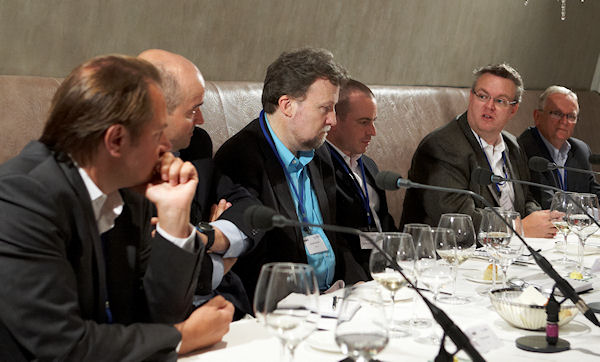The Holy Grail
Digital content services giant Rovi was the sponsor of a panel convened to discuss the future of digital content in a multi-screen environment in central London yesterday, and I attended on your behalf to get the word on the street.
We're at an interesting and possibly pivotal juncture in the evolution of digital content. We've all got our head around things like digital music downloads, e-books and YouTube, but the industry has yet to establish satisfactory revenue models in many cases and one Holy Grail - Internet TV - remains elusive.
The reason Rovi has such a strong interest in this topic is that it provides much of the background software, data and functionality that keeps digital content organised, allows it to be distributed over the web, and assists rights holders and extracting revenue from their property.
For example if you open up Spotify and read the review of an album, the chances are it was provided by Rovi. The metadata used by iTunes to organise millions of pieces of content it has is also a Rovi thing. It also does EPGs, advertising platforms and cloud services.
Rovi was represented by its chief evangelist - yes it has one - Richard Bullwinkle. Regular readers may remember our TV interview with him last year. Also present on the panel were Dan Saunders - head of content services at Samsung Europe, Clive Gardiner - SVP of Digital at We7, Richard Burrell - director of media operations at QVC UK, and Jean-Pierre Fumagalli, CEO of digital video advertising company Smartclip.

The first to speak was Saunders, who emphasised it was important for the connected TV market to achieve critical mass as quickly as possible. He said three quarters of TVs now sold in Europe are web-enabled, but declined to reveal what proportion of them is actually connected - saying it's still early days.
Bullwinkle was less reticent and said that while the proportion was around 15 percent a couple of years ago, it's now risen to over half. But he agreed that the industry was still trying to work out how best to tackle Internet TV and it probably isn't a ‘one size fits all' thing. While we're unlikely to ever have the kind of app relationship we have with mobile devices, people will probably customise their TVs in future to represent their tastes and preferences.
A good point was also made by by Burrell. Having described QVC as being half way between a shop and a TV programme, and noted it turns over $8 billion from five countries, he observed at connected TV enables content to be reused and re-monetised, increasing the return on investment.
The event took place immediately after Apple had made its iCloud announcement, and the first question from the floor asked for the panel's first impressions. As a direct competitor to Apple's music offerings, We7's Gardiner was predictably unsupportive, saying he had expected at least a music subscription service and noting "it's nowhere near what we do."
On the matter of iTunes Match, which allows you to replicate the music you have stored on your PC in the Apple cloud, regardless of how you got it, Bullwinkle said it's "a 25 dollar per year amnesty for anyone who ever stole music," and while it looks like shutting the stable door after the horse has bolted, it's better than nothing for the music labels. He doesn't think video rights-holders will ever be in the same position because their DRM is so much better.
Saunders pointed out that giving people additional benefits with legitimately acquired content provides the incentive not to pirate, and observed that there's already a collaborative equivalent of iTunes Match - called Ultra Violet - that also allows people to replicate content in the cloud.
One thing the whole panel seemed to agree on was that the broadcast experience needs to be respected on TV, and that people won't tolerate having to interact in the same way they do with PCs, and certainly won't put up with on-screen interruptions.
For this reason mobile devices are increasingly being looked to as the best way to augment the TV experience with online stuff. It has already become clear that tablets are mainly used when slumped in front of the box, and there are an increasing number of apps and services that are designed to provide you with content designed to complement what you're watching, and allow you to interact with it, or other viewers.
In short, people don't want to be faced with a wall of apps when they turn on their TV, but they may well be receptive to services that help them navigate the huge amount of web-based content already available and assist them in getting to something that will entertain them as quickly and efficiently as possible.
"Long term I worry about apps, because compartmentalising content is not a service to the user," concluded Bullwinkle, to which Saunders added "Smart TV should allow you to manage content in an intelligent, meaningful way." Amen to that.













